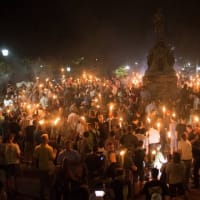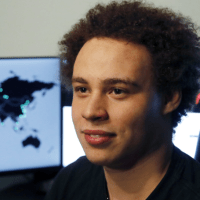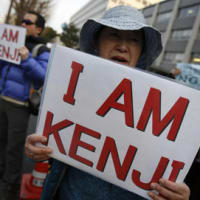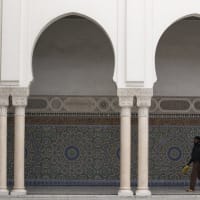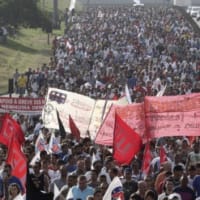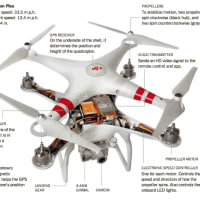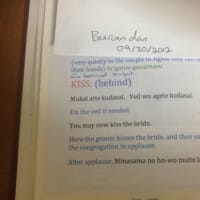Linguistics and Fiction In A Country Called Burma
ビルマと呼ばれる国の言語学と虚構
NPRはどうしても公共放送的で政府側に立つ論調とみられるなか、若い記者だろうか?かなり力んで、ビルマ呼称の留保もつけないミャンマーという呼称だけに結論づけている。 ちなみにヒラリーは、ニュースでは「この国 this country」と上手に両方の呼称から逃げ、確かスーチーさんのところではビルマと堂々と発言していた。彼女はスーチーさんといわゆる政治における「妥協の重要性」を話し、スーチーさんと意見の一致をみたと答えていた。 事象の後追いのメディア(記者)よりも、事象の主役である政治家(スーチーさんも含む)のほうか数段大人(役者が上)なのは言うまでもない。
by EDWARD SCHUMACHER-MATOS

U.S. Secretary of State Hillary Clinton (C) walks on the tarmac upon her arrival in Myanmar on Wednesday. Clinton arrived on the first top-level US visit for half a century.
ヒラリー・クリントン国務長官が水曜日にミャンマーに到着し、駐機場を歩いている。クリントン氏の訪問は50年ぶりの米国トップレベルの訪問となる。
The country many of us knew as Burma, a forgotten backwater for most Americans, is suddenly in play. Long a Chinese acolyte, the military-dominated government last month canceled a huge Chinese-financed dam project, deepened competing military collaboration with India and held a truncated election. This week, it hosted Hillary Rodham Clinton in what was the first visit by a U.S. secretary of state in more than 50 years.
ビルマとして私達の多くが知っているこの国は、殆どのアメリカ人にとって忘れ去られた存在であったが、突然国際舞台に戻ってきた。 長い間中国追従の姿勢をとってきた軍事独裁政府が、先月中国が資本による巨大なダム計画を突然キャンセルして、インドと軍事協力し対抗色を強め、不完全ながら選挙を実施したのだ。 そして、今週に入り、50年ぶりに米国の国務長官による訪問となる、クリントン長官を受け入れた。
Important news, but here's the rub: What do you call the country?
重要なニュースだが、問題がある。 つまり、この国をどう呼ぶべきか?
The U.S. government and many opposition leaders there say it's Burma. A military dictatorship changed the name 23 years ago to Myanmar, which many other nations accept. And the news media has been stuck with marbles in its mouth, divided over equally tongue-tying options: Myanmar "formerly" or "also" known as Burma. Diplomatic tempers at places like the United Nations boil over the difference, while locally, blood has spilled. It would all be farcical, if it weren't already tragic, and it gets worse. The fight is over the English name of the country. According to Cornell University, in Burmese, the main local language, all agree that the formal written name is Myanma (without the r).
米国政府と、多くの反体制指導者はビルマと主張している。 軍事独裁政権は23年前に国名をミャンマーに変更し、多くの国家はこれを受け入れている。 そこで、多くのニュースメディアはちょっと戸惑うことになる、つまりいずれも面倒な次の表現になるのである。 つまり一つは“正式には”ミャンマー、そしてもう一つは、ビルマ“としてもまた”知られている。 国連のような場での外交的駆け引きでは、その違いに議論が沸騰する、まして現地では血が流れているのだから。 それは、そんな悲劇がなかったとすれば、滑稽ですらあるが、それは悪化している。 その争いは、この国の英国名の問題である。 コーネル大学によると、現地の主要な言語であるビルマ語では、みんな、正式な記述上の名称はミャンマー(Myanma最後のrは無い)と言うことで一致している。
And when colloquially spoken, it's Bama.
そして、口語的にはバーマ( Bama )と話される。
Yes, that is right. Different words are used when written and spoken, which is common there. The two names actually come from the same linguistic root, according to Professor Emeritus James Matisoff at the University of California at Berkeley. The slightly different spellings of Burma/Bama and Myanmar/Myanma approximate the same pronunciation between the two languages.
その通りです。 話し言葉と書き言葉で異なった単語が使われるのです。そして、それはこの国では普通のことなのです。 二つの名前が実際は同じ言語的ルーツから派生していると、バークレイのカリフォルニア大学のエメリタス・ジェームズ・マチソフ教授は説明する。 少し異なる綴り、つまりBurma/(Bama)とMyanmar/(Myanma)とは二つの言葉ではあるが、殆ど同じように発音するのです。
So, did you get all that? 全部理解できましたか?
If you are confused, so apparently are NPR editors and reporters. Of the 17 stories on the main shows that mentioned the Southeast Asian country in the past 12 months, four said Myanmar "formerly" or "once" known as Burma. Two said Myanmar "also" known as Burma, one said "long known as Burma," and the others just gave it up. They said only Burma.
もし、混乱したときは、NPRの編集者や記者の場合も非常にはっきりしている。 この国について扱った、この一年の17の記事では、4つ記事が公称ミャンマー、或いはかつてビルマとしてしられている・・とし、2つのケースではビルマとしても知られているミャンマーとし、1つが長い間ビルマとして知られている・・としており、残りの5つは単にビルマと割り切って表現している。
NPR's stylebook specifies the "formerly" formula. But when I asked Ted Clark, the deputy supervisory senior foreign editor, what was correct, he wrote back: "The foreign desk always advises that the wording should be 'Myanmar, ALSO known as Burma.' Myanmar first, because we generally accept the name that a country/government chooses for itself, and then 'also known as Burma' because it is still known as Burma to many people there and around the world."
NPRの表現スタイルブック(社内用表現参考書)では「正式には」を定型としている。しかし、外報部の副編集長であるテッド・クラークに尋ねたところ、彼が「正しい」として書いてよこしたメモでは、「外報部は常に“ビルマとしても知られているミャンマー”とするようにしている」とミャンマーを第一義としている、なぜなら我々は一般的にその国(或いは政府)が自ら決めた呼称を受け入れているからであり、これにビルマとしても知られていると付記するのは、それが多くの人々や世界中で広く、未だに知られているからです。」と答えている。
This is not to embarrass Clark. The NPR stylebook often seems only to be suggestions honored in the breach, a chronic internal weakness. None of the naming formulas, moreover, are totally wrong. But I think that some are more right than others.
これは何もクラーク氏を困らせようと尋ねたのではない。 NPRの表現スタイルブックは往々にして問題を避ける、当たり障りのなさを身上としている節があるからだ、これは慢性的な社内の制度疲労でもある。 更に言えば、どの表現も、完全に間違いではない。 しかし、その中にも他に比べて、より適切な表現というものを追求するべきだと私は考えるのです。
"Burma" (favored by the U.S. and human rights groups) is antiquated and a bit of a fiction. Myanmar is the official, legal name and by now widely known. This makes the contortions of both the Myanmar "also" and "formerly"-known-as-Burma formulas unnecessary.
「ビルマ」(米国および人権団体が好む表記)は少し古臭くなっており、フィクションと言えないこともない。 ミャンマーは正式名称であり、合法的名称であり、しかも広く知れ渡ってもいる。 これが「ビルマとしても知られているミャンマー」或いは「ビルマとして知られている公称ミャンマー」という具合に表記を不必要なまでに“ねじれ”させているのである。
That said, I can live with either of the two latter pretzel positions for a little longer, given the political transition afoot in that distant country. The Burmese might democratically soon designate a name themselves. The primacy of saying Myanmar for now grows out of the thorny matter of political legitimacy.
地理的に離れた国で政治的移行が進行中ということで、この最後の2つの妥協表現のどちらでもいいということなのだ。 ビルマ人が、早晩自ら民主的に名称を決めるだろうからということで・・・・。 ミャンマーとハッキリ言ってしまうことは政治的な合法性という頭の痛い問題を助長する結果になるからだ。
The civilian party that in 1990 won the nation's last totally open election opposed a military regime's switch of the English name to Myanmar the previous year. Burma had been the standard since at least the 19th century and was seen by the party as a more inclusive term in a country divided and plagued by ethnic violence. Leading the opposition then and now is Nobel Peace laureate Aung San Suu Kyi.
1990年に、市民の党は、この国の最後の完全にオープンな選挙で勝利し、軍事政権が前年に行ったミャンマーへの国家名称変更に反対した。 ビルマは少なくとも19世紀まで正式に使われていた名称だったし、少数民族により分裂し、悩まされ続けたこの国に於いてより包含する意味合いの名称として同党はみていた。 そのとき市民の党を率いていたのは、現在でもそうだが、ノーベル平和賞受賞者のアウン・サン・スーチー女史である。
The military refused to turn over the government after the 1990 election. As a sign of support for democracy, the U.S. has downgraded its relations ever since by refusing to send an ambassador. Lower-level American diplomats are there. Still, the U.S., the UN and almost every world government recognized the Myanmar military government. It also was in clear control of the country. This means that it was at least legally legitimate, however abhorred, and had the right to change the country's name.
軍は1990年の選挙の後、政府を転覆する(選挙結果の受け入れ)のを拒否したので、アメリカは民主勢力への支援の意思の表明として、それ以来大使を送り込むことを拒否し、外交関係を断絶しないまでも一段低い位置づけにしたのである。 もちろん、それなりの外交官は派遣している。 とはいえ、米国も、国連も、そして世界の全ての国がミャンマーの軍事政権を承認してはいる。 また、その政権が同国を支配していることも明確である。 このことは少なくとも、国際社会から忌み嫌われているとはいえ、法的には合法的であることを意味しており、したがって自国の名称を変更する権利があると言える。
The military maintains that it is Myanmar that is the more inclusive name and that Burma is a colonial legacy left over from the British, who ruled there from the mid-19th century until after World War II. Many other former colonies have done the same in discarding the names given them by European powers. Think Rhodesia-Zimbabwe.
軍事政権が維持している主張は、ミャンマーはより包括的な呼び名であり、ビルマは19世紀中葉から第二次世界大戦まで当地を支配した英国から引き継いだ植民地時代の遺産であるというもので、他の多くの植民地も同じように欧州各国から付けられた名称を廃止しているという。 ローデシア ― ジンバブエ を考えてもらいたい。
This year, elections in March brought in a new, ostensibly civilian government under a retired general and former prime minister, Thein Sein. Aung San Suu Kyi and much—but not all—of her party boycotted the election, saying it was rigged. Clinton's trip, however, was made in part because of what President Barack Obama said were "flickers of progress" towards democracy. Some political prisoners have been released, and Suu Kyi has said she thinks President Sein has been sincere in opening talks with her.
今年、三月の選挙で、新しいうわべだけの市民政府が退役将軍で前首相のテイン・セインの下で誕生した。 アウン・サン・スーチー全部ではないが、多くの彼女の党員は、その選挙が不正だとしてボイコットしている。 しかしながら、クリントン国務長官の今次の訪問は、ある部分オバマ大統領が民主化への「前進の兆し」としたのを受けて実現した。 幾人かの政治犯は釈放され、スーチー女史もセイン大統領は彼女のと公開会談にも、今のところ、真摯に対応していると言っている。
While some human rights groups and opposition leaders have maintained their support for saying "Burma" in English, it's unclear how many of them today still hold that position. NPR, moreover, is not obliged to tip its hat to the U.S. diplomatic position and keep using the name Burma. NPR should say Myanmar, just as it says Beijing—without adding "formerly or also known as Peking." If in the future, another government—democratic, one hopes—wants to change its English name back to Burma, NPR can do it too. Then.
幾つかの人権団体や反体制指導者は英語での「ビルマ」の呼称の支持を続けているが、彼らのうちのどれほどの人達が、未だにその立場を維持しているかは明らかではない。 NPRは、更に言えば、アメリカの外交的な立ち位置に特に意を払う義務はなく、ビルマの呼称を使う義務もない。 NPRは、丁度、以前はペキンとして知られていている・・と付け加えることなく単にベイジンと呼称しているように、ミャンマーと言うべきだ。 もし将来、他の政府・・・民主的な政府が望ましいが・・がその英語名称をビルマに戻すことを望んだとしたら、NPRも当然その時初めてビルマと呼ぶことが出来る。
956
ビルマと呼ばれる国の言語学と虚構
NPRはどうしても公共放送的で政府側に立つ論調とみられるなか、若い記者だろうか?かなり力んで、ビルマ呼称の留保もつけないミャンマーという呼称だけに結論づけている。 ちなみにヒラリーは、ニュースでは「この国 this country」と上手に両方の呼称から逃げ、確かスーチーさんのところではビルマと堂々と発言していた。彼女はスーチーさんといわゆる政治における「妥協の重要性」を話し、スーチーさんと意見の一致をみたと答えていた。 事象の後追いのメディア(記者)よりも、事象の主役である政治家(スーチーさんも含む)のほうか数段大人(役者が上)なのは言うまでもない。
by EDWARD SCHUMACHER-MATOS

U.S. Secretary of State Hillary Clinton (C) walks on the tarmac upon her arrival in Myanmar on Wednesday. Clinton arrived on the first top-level US visit for half a century.
ヒラリー・クリントン国務長官が水曜日にミャンマーに到着し、駐機場を歩いている。クリントン氏の訪問は50年ぶりの米国トップレベルの訪問となる。
The country many of us knew as Burma, a forgotten backwater for most Americans, is suddenly in play. Long a Chinese acolyte, the military-dominated government last month canceled a huge Chinese-financed dam project, deepened competing military collaboration with India and held a truncated election. This week, it hosted Hillary Rodham Clinton in what was the first visit by a U.S. secretary of state in more than 50 years.
ビルマとして私達の多くが知っているこの国は、殆どのアメリカ人にとって忘れ去られた存在であったが、突然国際舞台に戻ってきた。 長い間中国追従の姿勢をとってきた軍事独裁政府が、先月中国が資本による巨大なダム計画を突然キャンセルして、インドと軍事協力し対抗色を強め、不完全ながら選挙を実施したのだ。 そして、今週に入り、50年ぶりに米国の国務長官による訪問となる、クリントン長官を受け入れた。
Important news, but here's the rub: What do you call the country?
重要なニュースだが、問題がある。 つまり、この国をどう呼ぶべきか?
The U.S. government and many opposition leaders there say it's Burma. A military dictatorship changed the name 23 years ago to Myanmar, which many other nations accept. And the news media has been stuck with marbles in its mouth, divided over equally tongue-tying options: Myanmar "formerly" or "also" known as Burma. Diplomatic tempers at places like the United Nations boil over the difference, while locally, blood has spilled. It would all be farcical, if it weren't already tragic, and it gets worse. The fight is over the English name of the country. According to Cornell University, in Burmese, the main local language, all agree that the formal written name is Myanma (without the r).
米国政府と、多くの反体制指導者はビルマと主張している。 軍事独裁政権は23年前に国名をミャンマーに変更し、多くの国家はこれを受け入れている。 そこで、多くのニュースメディアはちょっと戸惑うことになる、つまりいずれも面倒な次の表現になるのである。 つまり一つは“正式には”ミャンマー、そしてもう一つは、ビルマ“としてもまた”知られている。 国連のような場での外交的駆け引きでは、その違いに議論が沸騰する、まして現地では血が流れているのだから。 それは、そんな悲劇がなかったとすれば、滑稽ですらあるが、それは悪化している。 その争いは、この国の英国名の問題である。 コーネル大学によると、現地の主要な言語であるビルマ語では、みんな、正式な記述上の名称はミャンマー(Myanma最後のrは無い)と言うことで一致している。
And when colloquially spoken, it's Bama.
そして、口語的にはバーマ( Bama )と話される。
Yes, that is right. Different words are used when written and spoken, which is common there. The two names actually come from the same linguistic root, according to Professor Emeritus James Matisoff at the University of California at Berkeley. The slightly different spellings of Burma/Bama and Myanmar/Myanma approximate the same pronunciation between the two languages.
その通りです。 話し言葉と書き言葉で異なった単語が使われるのです。そして、それはこの国では普通のことなのです。 二つの名前が実際は同じ言語的ルーツから派生していると、バークレイのカリフォルニア大学のエメリタス・ジェームズ・マチソフ教授は説明する。 少し異なる綴り、つまりBurma/(Bama)とMyanmar/(Myanma)とは二つの言葉ではあるが、殆ど同じように発音するのです。
So, did you get all that? 全部理解できましたか?
If you are confused, so apparently are NPR editors and reporters. Of the 17 stories on the main shows that mentioned the Southeast Asian country in the past 12 months, four said Myanmar "formerly" or "once" known as Burma. Two said Myanmar "also" known as Burma, one said "long known as Burma," and the others just gave it up. They said only Burma.
もし、混乱したときは、NPRの編集者や記者の場合も非常にはっきりしている。 この国について扱った、この一年の17の記事では、4つ記事が公称ミャンマー、或いはかつてビルマとしてしられている・・とし、2つのケースではビルマとしても知られているミャンマーとし、1つが長い間ビルマとして知られている・・としており、残りの5つは単にビルマと割り切って表現している。
NPR's stylebook specifies the "formerly" formula. But when I asked Ted Clark, the deputy supervisory senior foreign editor, what was correct, he wrote back: "The foreign desk always advises that the wording should be 'Myanmar, ALSO known as Burma.' Myanmar first, because we generally accept the name that a country/government chooses for itself, and then 'also known as Burma' because it is still known as Burma to many people there and around the world."
NPRの表現スタイルブック(社内用表現参考書)では「正式には」を定型としている。しかし、外報部の副編集長であるテッド・クラークに尋ねたところ、彼が「正しい」として書いてよこしたメモでは、「外報部は常に“ビルマとしても知られているミャンマー”とするようにしている」とミャンマーを第一義としている、なぜなら我々は一般的にその国(或いは政府)が自ら決めた呼称を受け入れているからであり、これにビルマとしても知られていると付記するのは、それが多くの人々や世界中で広く、未だに知られているからです。」と答えている。
This is not to embarrass Clark. The NPR stylebook often seems only to be suggestions honored in the breach, a chronic internal weakness. None of the naming formulas, moreover, are totally wrong. But I think that some are more right than others.
これは何もクラーク氏を困らせようと尋ねたのではない。 NPRの表現スタイルブックは往々にして問題を避ける、当たり障りのなさを身上としている節があるからだ、これは慢性的な社内の制度疲労でもある。 更に言えば、どの表現も、完全に間違いではない。 しかし、その中にも他に比べて、より適切な表現というものを追求するべきだと私は考えるのです。
"Burma" (favored by the U.S. and human rights groups) is antiquated and a bit of a fiction. Myanmar is the official, legal name and by now widely known. This makes the contortions of both the Myanmar "also" and "formerly"-known-as-Burma formulas unnecessary.
「ビルマ」(米国および人権団体が好む表記)は少し古臭くなっており、フィクションと言えないこともない。 ミャンマーは正式名称であり、合法的名称であり、しかも広く知れ渡ってもいる。 これが「ビルマとしても知られているミャンマー」或いは「ビルマとして知られている公称ミャンマー」という具合に表記を不必要なまでに“ねじれ”させているのである。
That said, I can live with either of the two latter pretzel positions for a little longer, given the political transition afoot in that distant country. The Burmese might democratically soon designate a name themselves. The primacy of saying Myanmar for now grows out of the thorny matter of political legitimacy.
地理的に離れた国で政治的移行が進行中ということで、この最後の2つの妥協表現のどちらでもいいということなのだ。 ビルマ人が、早晩自ら民主的に名称を決めるだろうからということで・・・・。 ミャンマーとハッキリ言ってしまうことは政治的な合法性という頭の痛い問題を助長する結果になるからだ。
The civilian party that in 1990 won the nation's last totally open election opposed a military regime's switch of the English name to Myanmar the previous year. Burma had been the standard since at least the 19th century and was seen by the party as a more inclusive term in a country divided and plagued by ethnic violence. Leading the opposition then and now is Nobel Peace laureate Aung San Suu Kyi.
1990年に、市民の党は、この国の最後の完全にオープンな選挙で勝利し、軍事政権が前年に行ったミャンマーへの国家名称変更に反対した。 ビルマは少なくとも19世紀まで正式に使われていた名称だったし、少数民族により分裂し、悩まされ続けたこの国に於いてより包含する意味合いの名称として同党はみていた。 そのとき市民の党を率いていたのは、現在でもそうだが、ノーベル平和賞受賞者のアウン・サン・スーチー女史である。
The military refused to turn over the government after the 1990 election. As a sign of support for democracy, the U.S. has downgraded its relations ever since by refusing to send an ambassador. Lower-level American diplomats are there. Still, the U.S., the UN and almost every world government recognized the Myanmar military government. It also was in clear control of the country. This means that it was at least legally legitimate, however abhorred, and had the right to change the country's name.
軍は1990年の選挙の後、政府を転覆する(選挙結果の受け入れ)のを拒否したので、アメリカは民主勢力への支援の意思の表明として、それ以来大使を送り込むことを拒否し、外交関係を断絶しないまでも一段低い位置づけにしたのである。 もちろん、それなりの外交官は派遣している。 とはいえ、米国も、国連も、そして世界の全ての国がミャンマーの軍事政権を承認してはいる。 また、その政権が同国を支配していることも明確である。 このことは少なくとも、国際社会から忌み嫌われているとはいえ、法的には合法的であることを意味しており、したがって自国の名称を変更する権利があると言える。
The military maintains that it is Myanmar that is the more inclusive name and that Burma is a colonial legacy left over from the British, who ruled there from the mid-19th century until after World War II. Many other former colonies have done the same in discarding the names given them by European powers. Think Rhodesia-Zimbabwe.
軍事政権が維持している主張は、ミャンマーはより包括的な呼び名であり、ビルマは19世紀中葉から第二次世界大戦まで当地を支配した英国から引き継いだ植民地時代の遺産であるというもので、他の多くの植民地も同じように欧州各国から付けられた名称を廃止しているという。 ローデシア ― ジンバブエ を考えてもらいたい。
This year, elections in March brought in a new, ostensibly civilian government under a retired general and former prime minister, Thein Sein. Aung San Suu Kyi and much—but not all—of her party boycotted the election, saying it was rigged. Clinton's trip, however, was made in part because of what President Barack Obama said were "flickers of progress" towards democracy. Some political prisoners have been released, and Suu Kyi has said she thinks President Sein has been sincere in opening talks with her.
今年、三月の選挙で、新しいうわべだけの市民政府が退役将軍で前首相のテイン・セインの下で誕生した。 アウン・サン・スーチー全部ではないが、多くの彼女の党員は、その選挙が不正だとしてボイコットしている。 しかしながら、クリントン国務長官の今次の訪問は、ある部分オバマ大統領が民主化への「前進の兆し」としたのを受けて実現した。 幾人かの政治犯は釈放され、スーチー女史もセイン大統領は彼女のと公開会談にも、今のところ、真摯に対応していると言っている。
While some human rights groups and opposition leaders have maintained their support for saying "Burma" in English, it's unclear how many of them today still hold that position. NPR, moreover, is not obliged to tip its hat to the U.S. diplomatic position and keep using the name Burma. NPR should say Myanmar, just as it says Beijing—without adding "formerly or also known as Peking." If in the future, another government—democratic, one hopes—wants to change its English name back to Burma, NPR can do it too. Then.
幾つかの人権団体や反体制指導者は英語での「ビルマ」の呼称の支持を続けているが、彼らのうちのどれほどの人達が、未だにその立場を維持しているかは明らかではない。 NPRは、更に言えば、アメリカの外交的な立ち位置に特に意を払う義務はなく、ビルマの呼称を使う義務もない。 NPRは、丁度、以前はペキンとして知られていている・・と付け加えることなく単にベイジンと呼称しているように、ミャンマーと言うべきだ。 もし将来、他の政府・・・民主的な政府が望ましいが・・がその英語名称をビルマに戻すことを望んだとしたら、NPRも当然その時初めてビルマと呼ぶことが出来る。
956












